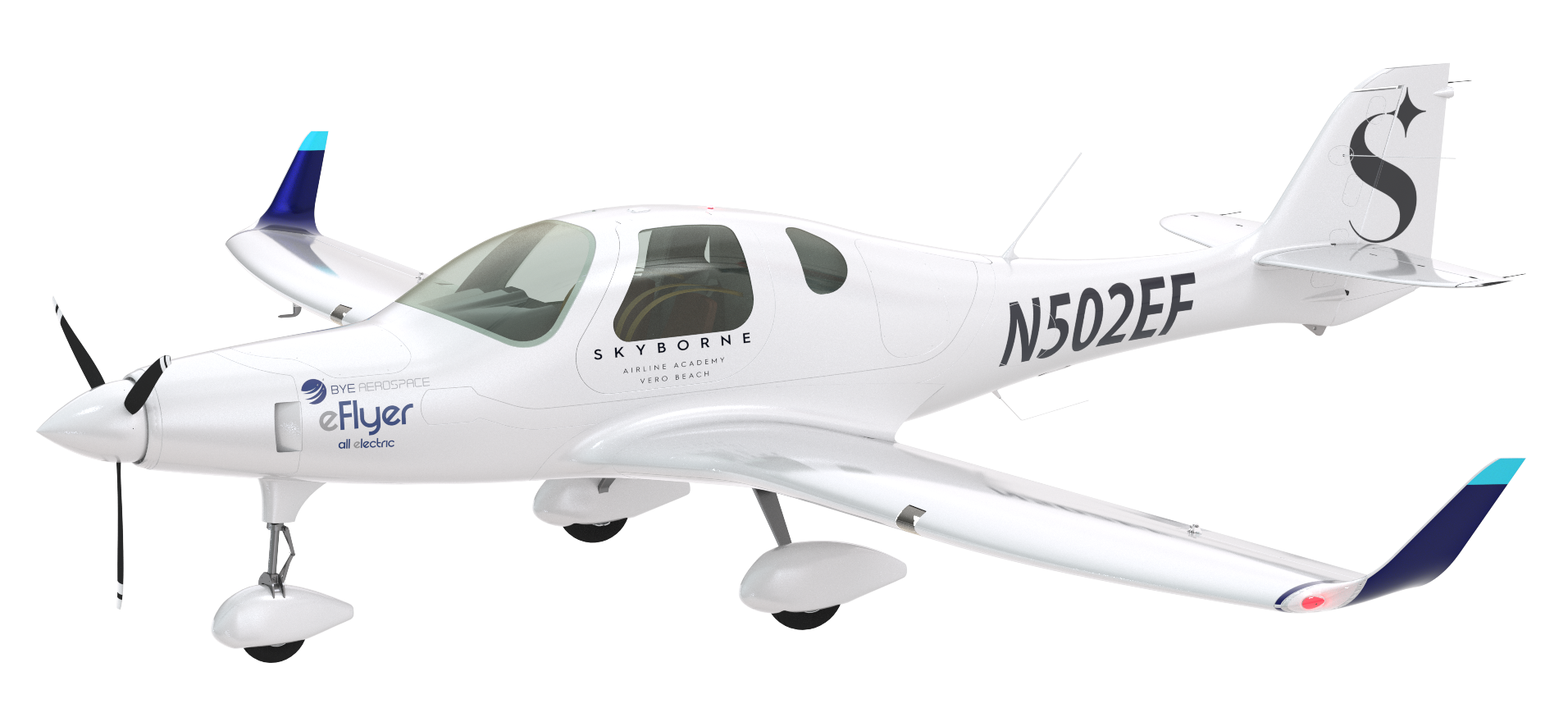Click Here to View This Page on Production Frontend
Click Here to Export Node Content
Click Here to View Printer-Friendly Version (Raw Backend)
Note: front-end display has links to styled print versions.
Content Node ID: 420295
Flight School Quadruples Commitment for Bye eFlyer Electric Training Aircraft
Skyborne Airline Academy has signed a letter of intent covering provisional orders for another 30 eFlyer electric trainer airplanes from Bye Aerospace, bringing the flight school’s total order to 40 aircraft, Bye announced Tuesday. The school, which has locations in the UK and Florida, made an initial commitment for 10 of Bye’s airplanes in 2020.
In addition to the two-seat eFlyer 2 trainer airplane, Bye is developing the four-seat eFlyer 4 and the nine-seat eFlyer 800 models for flight training and commercial applications such as passenger charter flights. According to Bye, the combined backlog of deposit-backed orders for the two-seat eFlyer 2 and four-seat eFlyer 4 now includes 889 units with an estimated total value of $570 million. The company has previously stated that it aims to roll its first eFlyer 2 aircraft off the production line in the next 12 months, and it expects to achieve type certification under the FAA’s Part 23 Amendment 64 regulations in 2025.
Life-cycle Assessment Study Shows Climate Benefits of Electric Aircraft
For the first time in electric aviation history, researchers have used aircraft life-cycle assessments to show that an electric airplane has a significantly smaller impact on Earth’s climate than an identical counterpart with a fossil fuel-burning powertrain. For the study, researchers at Chalmers University of Technology in Sweden compared the two-seat Pipistrel Alpha Trainer and the all-electric version of what is otherwise the exact same aircraft—the Pipistrel Alpha Electro—calculating the full impact of each from the extraction of raw material extraction to end of life.
The study found that, although the electric version had significantly less impact on the climate, “there is a trade-off regarding mineral resource scarcity…mainly due to rare metals in the batteries of the electric aircraft,” said lead author Rickard Arvidsson. The results were published online in the International Journal of Life Cycle Assessment.
Overair Is the Latest eVTOL Infrastructure Partnership for FBO Group Clay Lacy
Business aviation support group Clay Lacy Aviation is expanding its ambitions to be part of new eVTOL air taxi services with the announcement of a partnership with Overair. On Wednesday, the California-based companies announced plans to develop a concept of operations for Overair's five-passenger Butterfly aircraft, which is expected to begin flight testing this year and enter commercial service in 2028.
The companies said their collaboration will include electric charging facilities to be installed at Clay Lacy's FBOs at John Wayne Airport and Van Nuys Airport in the Los Angeles metropolitan area, and will also look at options for developing vertiports at other locations. Under their plan, Clay Lacy will focus on charging infrastructure and aircraft operation logistics, while Overair will provide expertise on aircraft integration, maintenance, certification, user and vertiport software integration, flight-path planning, and building public awareness. Overair recently announced partnerships with prospective operators and infrastructure stakeholders in locations including India, Texas, and South Korea.
Earlier this month, Clay Lacy announced a similar partnership with rival eVTOL aircraft developer Joby, which says it has developed a universal charging system that would work with multiple eVTOL models. "Ultra-quiet all-electric aircraft bring the promise of convenient and efficient transportation, easing traffic congestion and reducing travel times," said Scott Cutshall, senior vice president for strategy and sustainability at Clay Lacy. "This collaboration with the Overair team brings us one step closer to better serving the residents and communities in Southern California."
Jekta Selects Aircraft Management Solution for ‘Flying Boat’ Operations
Electric “flying boat” manufacturer Jekta has partnered with an aviation software start-up to support the development, certification, and operation of Jekta’s 19-seat seaplane, called Passenger Hydro Aircraft Zero Emission 100 (PHA-ZE 100).
French start-up Metavonics is providing Switzerland-based Jekta with an aircraft management platform based on its OpenMatrix Hub, a modular computing system that Metavonics says can increase operational efficiency while lowering costs. In a memorandum of understanding signed on January 17, Jekta agreed to integrate Metavonics’ compact hardware into the control unit supporting the auxiliary functions of the PHA-ZE 100 aircraft.
California Taps ZeroAvia To Develop Hydrogen Fuel Tankers
The California Energy Commission (CEC) has awarded ZeroAvia a $3.25 million grant to support the development of a mobile refueling system for future hydrogen-powered aircraft. ZeroAvia, a developer of hydrogen-electric powertrains, is working to design and build a first-of-a-kind refueling truck that can hold up to 10,000 liters (2,600 gallons) of liquid hydrogen and would be able to refuel an aircraft in about the same time it takes traditional jet fuel tankers. The Hollister, California-based company is building and testing the technology at Livermore Municipal Airport near San Francisco.
